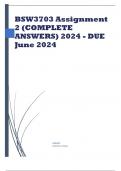BSW3703 Assignment
2 (COMPLETE
ANSWERS) 2024 - DUE
June 2024
ADMIN
[COMPANY NAME]
, CASE STUDY 1: DEVELOPMENT OF THE IKAGENG WITKOPPEN PRE-
PRIMARY SCHOOL This case study was facilitated by a Unisa student.
BACKGROUND The opening of the Ikageng Witkoppen Pre-Primary School in
January 1994 was the culmination of a participatory, grassroots, micro
development process that started in April 1993 and reached the
implementation stage just before the dawn of democracy in South Africa in
1994. Witkoppen is an affluent, white residential area of smallholdings north-
west of the greater Johannesburg area, in the district of Sandton. Witkoppen
has a flourishing business community. Large numbers of mainly black people
are employed as domestic workers and farm labourers. These employees are
socially and economically disadvantaged. The accommodation, education and
recreation of these labourers have not been given a high priority and few
facilities were developed in the past. The migrant labour situation meant that
families were split up, and a high percentage of the children growing up in this
area come from single-parent families. Accommodation for these families is
minimal and there is overcrowding, a lack of privacy and little transport. These
difficult conditions resulted in far-reaching social problems such as alcoholism,
prostitution, teenage pregnancy, and child neglect. During the years when
schooling was racially segregated, the Witkoppen School developed as a farm
school catering for the children of domestic workers and farm labourers as
well as children from squatter camps in the area. Most of the children came
from a socially and economically impoverished background. In the school
situation, this manifested itself in behavioural problems, an inability to
concentrate, tiredness, hunger, and a general malaise.
The development of Ikageng Witkoppen Pre-Primary School stands as a beacon of grassroots
efforts aimed at addressing socio-economic disparities in the Witkoppen area of South Africa.
Initiated in April 1993 and realized just before the dawn of democracy in 1994, this project
embodies a participatory approach to micro-development.
Situated in Witkoppen, an affluent, predominantly white residential area north-west of
Johannesburg, the school's establishment was a response to the glaring inequalities prevalent in




